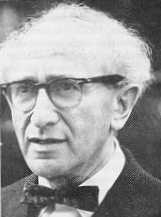A - B - C - D - E- F - G - H - I-J-K - L - M - N-O - P - Q - R - S - T-U - V-W - X-Y-Z
Lerner, Abba P. ( 1903-1982 )
Lerner, Abba P. nació en Bessaravia, Rusia, pero sus padres emigraron a Inglaterra cuando él era muy pequeño. Trabajó como maquinista, sombrerero, profesor de hebreo y empresario. En su juventud mantuvo ideas socialistas y estuvo muy próximo a los fabianos.
 Con 26 años ingresó como estudiante en la London School of Economics. Fue un estudiante brillante, que obtuvo premios y becas y, antes de graduarse, escribió y publicó articulos innovadores y reconocidos por sus profesores.
Con 26 años ingresó como estudiante en la London School of Economics. Fue un estudiante brillante, que obtuvo premios y becas y, antes de graduarse, escribió y publicó articulos innovadores y reconocidos por sus profesores.
En 1933 participó en la fundación y coeditó la prestigiosa revista Review of Economic Studies. En 1935 comenzó su actividad docente en la London School of Economics. En 1939 se traslada a Estados Unidos donde residirá el resto de su vida ejerciendo la docencia en un gran número de universidades: Columbia, Virginia, Kansas City, Amherst, The New School for Social Research, Roosvelt, John Hopkins, Michigan State y la Universidad de California en Berkeley.
Sus primeras publicaciones están en el campo de la teoría del comercio internacional. En 1934 establece como criterio paretiano la igualdad del precio al coste marginal y propone como sistema de medida del poder o grado de monopolio la diferencia entre esas dos variables. Participa junto con Oskar Lange y frente a Ludwig von Mises en la "polémica sobre el cálculo socialista".
Su obra magna fue Economics of Control en la que analiza, argumenta y justifica la utilización por los gobiernos de las "finanzas funcionales", es decir, la utilización de las finanzas públicas para conseguir una situación de pleno empleo con estabilidad de precios. Los problemas del control de la inflación en las situaciones de alto empleo le ocuparon trabajos posteriores, proponiendo la creación de un mercado de bonos que autorizarían a sus propietarios a realizar subidas de precios.
Ver, en este mismo CD-ROM o sitio web
, Ahorro e inversión: definiciones, supuestos y objetivos (PDF)
OBRAS
"The Diagrammatical Representation of Cost Conditions in International Trade", 1932, Economica.
"The Diagrammatical Representation of Elasticity of Demand", 1933, RES.
"The Diagrammatical Representation of Elasticity of Substitution", 1933, RES.
"The Diagrammatical Representation of Demand Conditions in International Trade", 1934, Economica.
"The Concept of Monopoly and the Measurement of Monopoly Power", 1934, RES.
"Economic Theory and Socialist Economy", 1934, RES.
"Economic Theory and Socialist Economy: Rejoinder", 1935, RES.
"The Symmetry Between Import and Export Taxes", 1936, Economica.
"Mr Keynes's General Theory", 1936, International Labor Review.
"A Note on Socialist Economies", 1936, RES
"Capital, Investment and Interest", 1936-7, Proceedings of Manchester Statistical Society
"Statics and Dynamics in Socialist Economics", 1937, EJ
"Theory and Practice of Socialist Economics", 1938, RES
"Alternative Formulations of the Theory of Interest", 1938, EJ.
"Saving Equals Investment", 1938, QJE.
"Saving and Investment: Definitions, assumptions and objectives", 1939, QJE.
"From Vulgar Political Economy to Vulgar Marxism", 1939, JPE.
"The Relation of Wage Policies and Price Policies", 1939, AER
"Some Swedish Stepping Stones in Economic Theory", 1940, Canadian JE .
"The Economic Steering Wheel", 1941, University Review, Kansas
"Functional Finance and the Federal Debt", 1943, Social Research.
"User Cost and Prime User Cost", 1943, AER
The Economics of Control: Principles of welfare economics, 1944.
"Interest Theory: Supply and demand for loans or supply and demand for cash?", 1944, RES.
"Strengthening the Economic Foundations of Democracy", with Oskar Lange, 1944, American Way of Business.
"Money", 1946, Encyclopaedia Britannica
"Money as a Creature of the State", 1947, AER.
"The Burden of the National Debt", 1948, in Income, Employment and Public Policy
"The Inflationary Process: Some theoretical aspects", 1949, REStat.
"Fighting Inflation", 1951, REStat
The Economics of Employment, 1951.
"Factor Prices and International Trade", 1952, Economica.
"The Essential Properties of Interest and Money", 1952, QJE.
"On the Marginal Product of Capital and the Marginal Efficieny of Investment", 1953, JPE.
""Consumption-Loan Interest and Money", 1959, JPE
"On Generalizing the General Theory", 1960, AER.
"The Burden of the Debt", 1961, REStat.
"A Note on the Rate of Interest and the Value of Assets", 1961, EJ.
"The Analysis of Demand", 1962, AER.
"Macro-Economics and Micro-Economics", 1962, in Nagel, Suppes and Tarski, editors, Logic, Methodology and Philosophy of Science
"Consumer's Surplus and Micro-Macro", 1963, JPE.
"Keynesian Economics in the Sixties", 1963, in Lekachman, editor, Keynes' General Theory.
"On Some Recent Developments in Capital Theory", 1965, AER.
"Employment Theory and Employment Policy", 1967, AER.
"The Economist's Can-Opener", 1968, Western EJ.
"On Optimal Taxes with an Untaxable Sector", 1970, AER.
Flation: not inflation of prices, not deflation of jobs., 1972.
""Money, Debt and Wealth", 1973, in W. Sellekaerts, editor, Econometrics and Economic Theory
"From the Treatise on Money to the General Theory", 1974, JEL.
"Principles of Efficient Economic Policy", 1975, in Ben- Shabar, Economics of Efficiency and Growth.
"Marginal Cost Pricing in the 1930s", 1977, AER.
"From Pre-Keynes to Post-Keynes", 1977, Social Research.
"Utilitarian Marginalism", 1978, Eastern EJ.
"The Scramble for Keynes' Mantle", 1978, JPKE.
"On Keynes, Policy and Theory: A grumble", 1979, Social Research.
"A Keynesian on Hayek", 1980, Challenge.
MAP: A Market Anti-Inflation Plan, with D.Colander, 1980.
"Paleo-Austrian Capital Theory", 1983, in Colander, editor, Selected Economic Writings of Abba Lerner